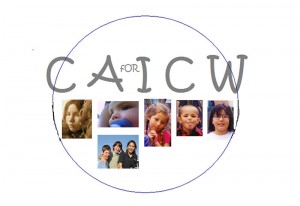.Holyfield – the first case in which the federal high court has construed ICWA,
Mississippi Choctaw Indian Band v. Holyfield, 490 US 30 (1989) Docket No. 87-980, Argued January 11, 1989, Decided April 3, 1989, CITATION: 490 U.S. 30, 109 S.Ct. 1597, 104 L.Ed.2d 29 (1989),
DISCUSSION: I A The Indian Child Welfare Act of 1978 (ICWA), 92 Stat. 3069, 25 U.S.C. 1901-1963, was the product of rising concern in the mid-1970’s over the consequences to Indian children, Indian families, and Indian tribes of abusive child welfare practices that resulted in the separation of large numbers of Indian children from their families and tribes through adoption or foster care placement, usually in non-Indian homes.
Dissenting footnotes: STEVENS, J., filed a dissenting opinion, in which REHNQUIST, C. J., and KENNEDY, J., joined.
[ Footnote 8 ] The explanation of this subsection in the House Report reads as follows: “Subsection (b) directs a State court, having jurisdiction over an Indian child custody proceeding to transfer such proceeding, absent good cause to the contrary, to the appropriate tribal court upon the petition of the parents or the Indian tribe. Either parent is given the right to veto such transfer. The subsection is intended to permit a State court to apply a modified doctrine of forum non conveniens, in appropriate cases, to insure [490 U.S. 30, 61] that the rights of the child as an Indian, the Indian parents or custodian, and the tribe are fully protected.” Id., at 21. In commenting on the provision, the Department of Justice suggested that the section should be clarified to make it perfectly clear that a state court need not surrender jurisdiction of a child custody proceeding if the Indian parent objected. The Department of Justice letter stated:
“Section 101(b) should be amended to prohibit clearly the transfer of a child
placement proceeding to a tribal court when any parent or child over the age of
12 objects to the transfer.” Id., at 32.
Although the specific suggestion made by the Department of Justice was not in fact implemented, it is noteworthy that there is nothing in the legislative history to suggest that the recommended change was in any way inconsistent with any of the purposes of the statute.
[ Footnote 9 ] Chief Isaac elsewhere expressed a similar concern for the rights of parents with reference to another provision. See Hearing, supra n. 1, at 158 (statement on behalf of National Tribal Chairmen’s Association)
(“We believe the tribe should receive notice in all such cases but where the
child is neither a resident nor domiciliary of the reservation intervention
should require the consent of the natural parents or the blood relative in whose
custody the child has been left by the natural parents. It seems there is a
great potential in the provisions of section 101(c) for infringing parental
wishes and rights”).
But when an Indian child is deliberately abandoned by both parents to a person off the reservation, no purpose of the ICWA is served by closing the state courthouse door to them. The interests of the parents, the Indian child, and the tribe in preventing the unwarranted removal of Indian children from their families and from the reservation are protected by the Act’s substantive and procedural provisions. In addition, if both parents have intentionally invoked the jurisdiction of the state court in an action involving a non-Indian, no interest in tribal self-governance is implicated. See McClanahan v. Arizona State Tax Comm’n, 411 U.S. 164, 173 (1973); Williams v. [490 U.S. 30, 64] Lee, 358 U.S. 217, 219 -220 (1959); Felix v. Patrick, 145 U.S. 317, 332 (1892).
In Bridget R. –In re Bridget R. (1996) 41 Cal.App.4th 1483 (Bridget R.). January 19, 1996 , LLR No. 9601041.CA, Cite as: LLR 1996.CA.41 – The Pomo Twins
[33] As we explain, recognition of the existing Indian family doctrine is necessary in a case such as this in order to preserve ICWA’s constitutionality. We hold that under the Fifth, Tenth and Fourteenth Amendments to the United States Constitution, ICWA does not and cannot apply to invalidate a voluntary termination of parental rights respecting an Indian child who is not domiciled on a reservation, unless the child’s biological parent, or parents, are not only of American Indian descent, but also maintain a significant social, cultural or political relationship with their tribe.
[145] *fn11 We note in passing that Congress in 1987 failed to approve amendments to ICWA which were described in materials considered by the Senate Select Committee on Indian Affairs as having the effect of precluding application of the existing Indian family doctrine. (See Hearings before the Senate Select Com. on Indian Affairs, United States Senate, 100th Cong., 1st Sess. on Oversight Hearings on the Indian Child Welfare Act, Nov. 10, 1987, Appendix B, pp. 167-171.)
In re Alexandria Y.
(1996) 45 Cal.App.4th 1483, –
which applied the “existing Indian family doctrine” to a proceeding to terminate parental rights and implement a pre-adoptive placement.
…., the Fourth District held that “recognition of the existing Indian family doctrine [was] necessary to avoid serious constitutional flaws in the ICWA” (In re Alexandria Y., supra, 25 Cal.App.4th at p. 1493), and held that the trial court had acted properly in refusing to apply the ICWA “because neither [the child] nor [the mother] had any significant social, cultural, or political relationship with Indian life; thus, there was no existing Indian family to preserve.” (Id. at p. 1485.)
The court observed that not only did neither the mother nor the child have any relationship with the tribe, but also that the father was Hispanic, and that the child was placed in a preadoptive home where Spanish was spoken. “Under these circumstances,” the court commented, “it would be anomalous to allow the ICWA to govern the termination proceedings. It was clearly not the intent of the Congress to do so.” (Id. at p. 1494.)
From Santos y,
In re SANTOS Y., a Person Coming Under the Juvenile Court Law, In re Santos Y. (2001) , Cal.App.4th [No. B144822. Second Dist., Div. Two. July 20, 2001.]
“Application of the ICWA to a child whose only connection with an Indian tribe is a one-quarter genetic contribution does not serve the purpose for which the ICWA was enacted, “to protect the best interests of Indian children and to promote the stability and security of Indian tribes and families” (25 U.S.C. § 1902).”
The court paid “particular attention to In re Bridget R., and quoted from Bridget R.’s due process and equal protection analysis at relative length.”
They also said, “We do not disagree with the proposition that preserving Native-American culture is a significant, if not compelling, governmental interest. We do not, however, see that interest being served by applying the ICWA to a multi-ethnic child who has had a minimal relationship with his assimilated parents, particularly when the tribal interests “can serve no purpose which is sufficiently compelling to overcome the child’s right to remain in the home where he . . . is loved and well cared for, with people to whom the child is daily becoming more attached by bonds of affection and among whom the child feels secure to learn and grow.” (In re Bridget R., supra, 41 Cal.App.4th at p. 1508.)”
Finally, Santos states, “Congress considered amending the ICWA to preclude application of the “existing Indian family doctrine” but did not do so.”
RE: Santos Footnotes, – Existing Family Doctrine:
¬FN 15. Accepting the doctrine: Alabama (S.A. v. E.J.P. (Ala.Civ.App. 1990) 571 So.2d 1187); Indiana (Matter of Adoption of T.R.M. (Ind. 1988) 525 N.E.2d 298); Kansas (Matter of Adoption of Baby Boy L. (Kan. 1982) 643 P.2d 168); Kentucky (Rye v. Weasel (Ky. 1996) 934 S.W. 2d 257); Missouri (In Interest of S.A.M. (Mo.App. 1986) 703 S.W.2d 603); New York (In re Adoption of Baby Girl S. (Sur. 1999) 690 N.Y.S. 2d 907); Oklahoma (Matter of Adoption of Baby Boy D. (Ok. 1985) 742 P.2d 1059); Tennessee (In re Morgan (Tenn.Ct.App. 1997) WL 716880); Washington (Matter of Adoption of Crews (Wash. 1992) 825 P.2d 305).
Rejecting the doctrine: Alaska (Matter of Adoption of T.N.F. (Alaska 1989) 781 P.2d 973); Idaho (Matter of Baby Boy Doe (Idaho 1993) 849 P.2d 925); Illinois (In re Adoption of S.S. (Ill. 1995) 657 N.E.2d 935); New Jersey (Matter of Adoption of a Child of Indian Heritage (N.J. 1988) 111 N.J. 155, 543 A.2d 925); South Dakota (Matter of Adoption of Baade (S.D. 1990) 462 N.W.2d 485); Utah (State, in Interest of D.A.C. (Utah App. 1997) 933 P.2d 993.)
United States Code Title 25 – Indians Chapter 21 – Indian Child Welfare
§ 1911. Indian tribe jurisdiction over Indian child custody proceedings(b) Transfer of proceedings; declination by tribal Court: In any State court proceeding for the foster care placement of, or termination of parental rights to, an Indian child not domiciled or residing within the reservation of the Indian child’s tribe, the court, in the absence of good cause to the contrary, shall transfer such proceeding to the jurisdiction of the tribe, absent objection by either parent, upon the petition of either parent or the Indian custodian or the Indian child’s tribe: Provided, That such transfer shall be subject to declination by the tribal court of such tribe.
(Ftn 1) “The 2000 Census indicated that as much at 66 percent of the American Indian and Alaska Native population live in urban areas,” the Senate Indian Affairs Committee wrote in a views and estimates letter on March 2 2007. http://www.indianz.com/News/2007/001803.asp
(ftn2) 14th Amendment, Section 1: “All persons born or naturalized in the United States, and subject to the jurisdiction thereof, are citizens of the United States and therefore have all the privileges or immunities of citizens of the United States. No State shall make or enforce any law which shall abridge the privileges or immunities of citizens of the United States; nor shall any State deprive any person of life, liberty, or property, without due process of law; nor deny to any person within its jurisdiction the equal protection of the laws.”
.



